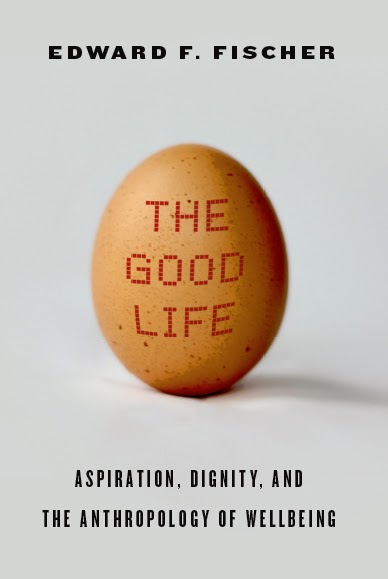Merle Hazard's new single, Dual Mandate, entertains and elucidates as he explains the Federal Reserve's core tension: "Rich folks like to see the currency strong / But the average Joe’s not overjoyed if he’s destitute, and unemployed." Check out the PBS report, with cometary from Paul Krugman and Charles Calomiris, and see the full video:
Thursday, October 30, 2014
Saturday, October 11, 2014
Cash, Credit, or The Good Life
When shopping, we behave differently when we pay in cash versus when we use a card (credit, debit, or gift). This is one of those everyday anomalies that belie our economic rationality, and many theoretical expectations, and yet that make sense. The feel of having cash in hand, the deliberate act of handing over bills, the material loss of paying--the very physicality of the act focuses our attention sharply on price. Using a card is "one step removed from having green cash money leave [your] flesh-and-blood hands," and thus the pain of paying is made more distant, as Ron Lieber argues in the NY Times.
Studies have shown that customers are willing to pay significantly more for the same item when using a card, and that card paying consumers are more concerned with features and quality compared to price. Thus, Dave Ramsey and a host of self-help gurus advise us to use cash as a way of nudging us to be more rational and prudent. Paul Roberts argues in The Impulse Society that credit cards feed into our accelerating desires for instant gratification.
 But perhaps there is an upside to being less price sensitive (within reason, of course). In my book The Good Life, I look at German shoppers, who still mostly use cash in their supermarket transactions. They often express a preference for products that carry positive social values (organic, fair trade, etc.) and for quality. Yet, when the cash actually changes hands, they often opt for lower priced alternatives. This suggests that paying in cash curbs our enthusiasm for doing the right thing. Perhaps, then, when one can afford it (a separate issue), we would be doing more for the greater good to be less price sensitive--willing to pay for quality and the job dignity and social values that go with it.
But perhaps there is an upside to being less price sensitive (within reason, of course). In my book The Good Life, I look at German shoppers, who still mostly use cash in their supermarket transactions. They often express a preference for products that carry positive social values (organic, fair trade, etc.) and for quality. Yet, when the cash actually changes hands, they often opt for lower priced alternatives. This suggests that paying in cash curbs our enthusiasm for doing the right thing. Perhaps, then, when one can afford it (a separate issue), we would be doing more for the greater good to be less price sensitive--willing to pay for quality and the job dignity and social values that go with it.
Studies have shown that customers are willing to pay significantly more for the same item when using a card, and that card paying consumers are more concerned with features and quality compared to price. Thus, Dave Ramsey and a host of self-help gurus advise us to use cash as a way of nudging us to be more rational and prudent. Paul Roberts argues in The Impulse Society that credit cards feed into our accelerating desires for instant gratification.
 But perhaps there is an upside to being less price sensitive (within reason, of course). In my book The Good Life, I look at German shoppers, who still mostly use cash in their supermarket transactions. They often express a preference for products that carry positive social values (organic, fair trade, etc.) and for quality. Yet, when the cash actually changes hands, they often opt for lower priced alternatives. This suggests that paying in cash curbs our enthusiasm for doing the right thing. Perhaps, then, when one can afford it (a separate issue), we would be doing more for the greater good to be less price sensitive--willing to pay for quality and the job dignity and social values that go with it.
But perhaps there is an upside to being less price sensitive (within reason, of course). In my book The Good Life, I look at German shoppers, who still mostly use cash in their supermarket transactions. They often express a preference for products that carry positive social values (organic, fair trade, etc.) and for quality. Yet, when the cash actually changes hands, they often opt for lower priced alternatives. This suggests that paying in cash curbs our enthusiasm for doing the right thing. Perhaps, then, when one can afford it (a separate issue), we would be doing more for the greater good to be less price sensitive--willing to pay for quality and the job dignity and social values that go with it.
Saturday, October 4, 2014
Measures of Happiness and Wellbeing
 Who are the happiest people in the world? In what countries do we find the highest life satisfaction? These are different questions, with different answers. Cheery contentment (hedonic happiness) is not the same as long-term wellbeing (eudaimonia), as I argue in The Good Life.
Who are the happiest people in the world? In what countries do we find the highest life satisfaction? These are different questions, with different answers. Cheery contentment (hedonic happiness) is not the same as long-term wellbeing (eudaimonia), as I argue in The Good Life.
Martin Seligman, in his book Flourish, writes that "Colombia, Mexico, Guatemala, and the other Latin American countries are a lot happier than they should be given their low gross domestic product." High GDP might not guarantee happiness or wellbeing--but it also doesn't hurt as a comilations of wellbeing indices assembled by Korn Ferry shows:
World Database of Happiness Top Ten:
1. Costa
Rica
2. Denmark
3. Iceland
4. Switzerland
5. Finland
6. Mexico
7. Norway
8. Canada
9. Panama
10. Sweden
The Legatum Prosperity Index
1. Costa
Rica
2. Denmark
3. Iceland
4. Switzerland
5. Norway
6. Finland
7. Mexico
8. Sweden
9. Canada
10. Panama
The Legatum Prosperity Index
1. Costa
Rica
2. Denmark
3. Iceland
4. Switzerland
5. Norway
6. Finland
7. Mexico
8. Sweden
9. Canada
10. Panama
And Gallup has a new "Positive Experience Index" (measuring the occurrence of certain positive experiences the previous day) that tilts heavily Latin America:
Gallup’s Positive Experience Index
1. Paraguay
2. Panama
3. Guatemala
4. Nicaragua
5. Ecuador
6. Costa
Rica
7. Colombia
8. Denmark
9. Honduras
10. Venezuela
11. El
Salvador
Subscribe to:
Posts (Atom)



